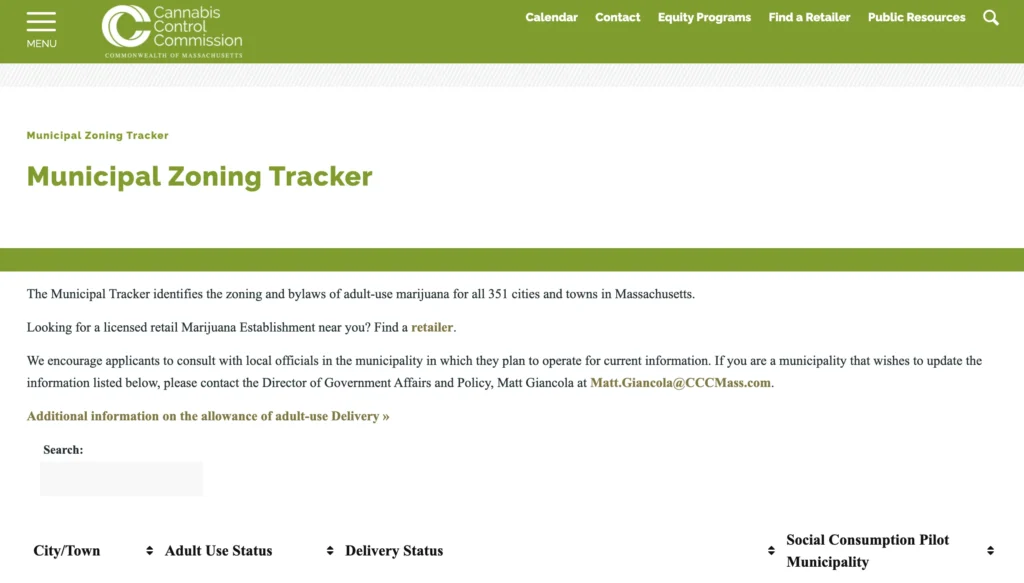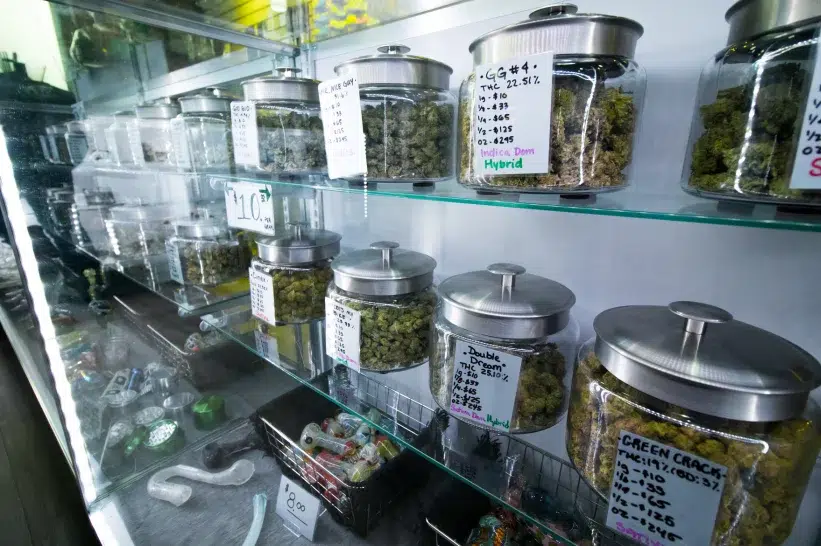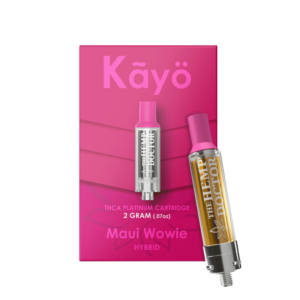Despite troubles and delays in weed logistics and deliveries, Massachusetts remain one of the most prolific states ever since it opened its doors on legal recreational cannabis back in 2016.
Eight years later, Massachusetts-based dispensaries amassed $7 billion in total sales of medical and recreational cannabis, $1 billion higher than 2018’s peak sales ($6 billion). As you can see, opening a dispensary in Massachusetts is a rewarding venture for those patient enough to go through the process of opening one.
Ready to take the risk? This guide will walk you through the process of successfully opening a dispensary in Massachusetts.
Medical Cannabis:
Yes
Recreational Cannabis:
Yes
Hemp-Derived:
Yes
License Application:
Open
Understanding Massachusetts Cannabis Laws

Before opening a dispensary, it’s crucial to familiarize yourself with the Massachusetts cannabis laws. The state has specific regulations concerning the sale, distribution, and cultivation of cannabis.
In general, these are the non-negotiable laws you need to observe once your cannabis business has been established in Massachusetts:
- Dispensaries can only serve adults 21+.
- You’re only allowed to dispense up to 1 ounce of cannabis, 5 grams of concentrates, or 500 mg of edibles per day.
- Consumers are allowed multiple daily transactions as long as they don’t exceed the daily purchase limit.
- The state’s chosen seed-to-sale tracking program is Metrc.
A critical component of Massachusetts cannabis law is the Cannabis Control Commission (CCC), which oversees the licensing and regulation of marijuana businesses. The CCC’s guidelines cover everything from security measures to advertising restrictions.
Additionally, local municipalities can enact zoning laws and regulations for cannabis businesses. This means that once you have a state license, you must also secure local approval, which could involve public hearings and community agreements.
How to Open a Dispensary in MA: From Planning, Licensing, to Opening
Follow the steps chronologically to experience smooth and organized behind-the-scenes planning for opening a dispensary in Massachusetts.
Step 1: Creating a Business Plan

A solid business plan is the foundation of your dispensary. It should outline your business model, target cannabis market, competitive analysis, and financial projections. This plan guides your operations and is essential for securing funding.
A well-crafted business plan attracts investors and shows that you are serious and have thought through every aspect of your business.
Aside from the basic information needed to complete a business plan, here are some of the elements to consider in creating a cannabis dispensary business plan:
Include a detailed analysis of your competitors.
What are your competitor’s strengths and weaknesses? How do they attract and retain customers? Understanding your competition helps you carve out a unique space in the market.
Determine your target customer.
Consider your target customer and tailor your products and services to meet their needs. Focusing on a niche target market can differentiate your dispensary and build brand loyalty.
Estimate your expenses and revenue.
Another crucial element of your business plan is the financial section, where you estimate your expenses and revenue. Opening a dispensary involves significant initial costs, including licensing application fees, real estate, inventory, and salaries.
Additionally, you’ll need to budget for ongoing operational costs and marketing. Accurate financial projections will help you pinpoint the required funding and guide your financial decisions as your business grows.
Step 2: Securing Funding
Opening a dispensary requires significant funding. If not from your personal savings, you may need to access other sources of capital, like loans and investors. Having a business plan can immensely help in your quest for funding.
Here is the complete list of traditional ways of securing funding:
- Self-funding
- Friends and family
- Business partners
- Bank loans
- Private funds
- Brokers
Here are some funding alternatives to consider:
State-specific funding programs and grants.
Consider exploring state-specific funding programs and grants. Massachusetts has implemented a social equity program for cannabis to make the industry more inclusive. These programs offer financial assistance and business development resources to qualified applicants. Leveraging these programs can provide much-needed support as you navigate the early stages of your business.
Crowdfunding.

This can be another viable option for raising funds. Platforms like Kickstarter or Indiegogo allow you to pitch your business idea to the public. Backers might receive product samples or other incentives in return for their investment.
Crowdfunding helps raise capital and serves as a marketing tool, generating buzz and attracting future customers.
| 📝 Important Note Potential dispensary owners have to disclose the source of their capital. This includes the name, address, contact information, and amount of the fund’s source. Additionally, you need to be able to submit documentation verifying the existence of the fund and the outline of its payback terms. |
Step 3: Finding a Location
You need to have chosen a location with a municipality’s approval to continue with your license application. The physical shop doesn’t need to be fully furnished or complete during the time of application. You may start building the architectural plan after receiving the license.
The location greatly influences a dispensary’s success. It’s crucial to take your time with it rather than committing to a subpar location with high rental rates. Here are some things to consider when finding a physical location:
A. Research areas with high foot traffic.
A well-situated dispensary in a busy commercial area or near popular attractions can attract more walk-in traffic, boosting sales and visibility.
B. Ensure the location complies with zoning laws and regulations.
In Massachusetts, dispensaries cannot be within 500 feet of schools and daycares (municipalities have their own specific distances). Dispensaries can only be established in municipalities that accept cannabis businesses.
Find specific zoning laws per municipality here.

C. Consider the demographics of your potential customers.
Are they young professionals, retirees, tourists, or a mix? Understanding your customer base will help you choose a location that aligns with their routines and preferences.
D. The size and layout of your space are also crucial factors.
You’ll need adequate space for marijuana retail displays, secure storage for inventory, areas for staff, and ample parking space.
Properly planning your dispensary’s layout can enhance the customer experience and streamline operations. Consider consulting with a professional to design a functional and inviting space.
Step 4: Obtaining Licenses and Permits
One of the most critical steps is obtaining the licenses and permits to operate legally. This includes state licenses issued by the Cannabis Control Commission (CCC) and local permits from your city or town. The application process is rigorous and requires thorough documentation, so starting early is essential.
Before proceeding with the step-by-step process of applying for a license on the online portal, here are some general facts you need to know.
The licensing application fee for a recreational marijuana dispensary in Massachusetts is $1,500, and the annual license fee costs $50,000. These fees add up quickly, so budget accordingly.
Additionally, your application must contain all necessary information to avoid delays. You must also have all the required documents beforehand, such as the detailed operational, business, and diversity plans. Once submitted, review times can vary, but comprehensive and accurate documentation will help expedite the process.
Priority is given to social equity applicants and Economic Empowerment applicants, which promotes diversity and inclusion in the cannabis industry. Your application may be processed more quickly if you qualify for these categories. However, it’s still essential to ensure you meet all the requirements and comply with state regulations to secure your license.
Here’s the multi-step process of registering and applying to the Massachusetts Cannabis Industry Portal (MassCIP):
A. Click this link (https://www.massciportal.com/login-register) to get into MassCIP. Register and create an account with Mass CIP.
B. Compile the following documents under each of three mandatory sections:
Application of Intent
- Hosting Community Agreement Certification
- Community Outreach Meeting attestation and documentation
- Plan to be compliant with local ordinances
- Plan to help those disproportionately harmed people
Background Check Section
- CORI Acknowledgement Form
- Disclosure and Acknowledgement Form
- Release Authorization Form
Management and Operations Profile Section
- Bylaws
- Certificates of good standing
- Business Plan
- Liability Insurance Plan
- Proposed Timeline
- Summary of Operating Plans, Policies, and Procedures
- Plan for obtaining marijuana from licensed marijuana establishments
- Diversity Plan
| 📝 Important Note The forms mentioned are all available on CCC’s Forms and Templates page. After filling them out, you must scan each page and the government-issued identification card. Then, put them together in one file, label it appropriately, and upload it. |
C. Once you’re ready to start the online application process, pay the one-time nonrefundable fee of $1,500.
D. Once submitted, your application will be reviewed. Social equity and Economic Empowerment applicants will be given special priority. If additional information and missing ones need to be complied with, you’ll typically receive a notification in your account or email.
E. Pay the background checks and wait within 90 days for the Commission’s decision.
| 📝 Important Note In addition to state licenses, you must obtain local permits. This often involves working with city or town officials, including public hearings and community agreements. Each municipality has its own process and requirements, so it’s important to familiarize yourself with local regulations and build positive relationships with local officials and community members. |
Step 5: Designing Your Dispensary
The design of your dispensary should provide a welcoming and secure environment for customers. Consider factors such as layout, security measures, and compliance with state regulations. A good design enhances the customer experience and improves operational efficiency.
Security is a major consideration in the cannabis industry. State laws require that dispensaries have robust security measures, including surveillance cameras, alarm systems, and secure storage for cannabis products.
The layout of your dispensary should facilitate a smooth flow of customers and staff. Consider separate areas for product displays, checkout counters, and consultation rooms.
An open and well-organized space can create a positive shopping experience and make it easier for employees to assist customers. Leveraging professional design services can help you create a functional and aesthetically pleasing space.
Step 6: Hiring and Training Staff
Your team will be the face of your dispensary. Hire knowledgeable and friendly staff and provide comprehensive training on product knowledge, customer service, and compliance with state regulations.
Well-trained employees can enhance the customer experience, providing valuable information and building trust with your clientele.
Employee training should cover all aspects of your business, from product details to security protocols. Staff should understand the different cannabis products you offer and be able to make informed recommendations based on customer needs.
Training on compliance and state regulations is also essential to ensure that your dispensary operates within the law.
Creating a positive workplace culture can also improve employee retention and satisfaction. Foster a workspace where employees feel valued and motivated. Regular team meetings, professional development opportunities, and recognition of achievements contribute to a supportive and collaborative work atmosphere.
Step 7: Stock Up Inventory

If you’re not a vertical business, you need external suppliers to stock your inventory with quality cannabis products. Partnering with the best in the industry will dictate your store’s quality reputation among customers.
Here are the things to check in finding a good cannabis supplier:
- The product range they carry. Are they diverse enough to cater to your customer’s specific needs?
- Quality and freshness of the products
- Smoothness of the fulfillment operations
- Affordability
- Quality tests in the form of COA (Certificate of Analysis)
- Are they responsive? Honors their word?
Step 8: Marketing Your Dispensary
Effective marketing strategies will help attract customers to your dispensary. Utilize online marketing, social media, and community events to build your brand.
Having an online presence is crucial. Create a user-friendly website for mobile and desktop that showcases your products and provides information about your dispensary. Use search engine optimization (SEO) to improve your website’s ranking in search engine results.
Community outreach and events can further enhance your brand’s visibility. Hosting educational workshops or participating in local events builds relationships with community members and establishes your dispensary as a trusted source of cannabis products.
Partnering with local businesses creates mutually beneficial opportunities for collaboration and promotion.
Final Thoughts on Opening a Dispensary in Massachusetts
Opening a dispensary in Massachusetts involves several detailed steps, from understanding state laws to securing a location and obtaining licenses. By following this guide and ensuring compliance at every stage, you can navigate the complexities of the process and establish a successful business in the burgeoning cannabis industry.
Partnering with experienced and well-established suppliers like The Hemp Doctor Wholesale will increase your chances of success. Our 15 years of expertise in cannabis retail, combined with innovative cannabis products, will help you stand out in this competitive market.
FAQs
Do dispensaries share information with the government Massachusetts?
No. By practice, dispensaries in Massachusetts don’t share detailed and private customer information with government agencies. The scanning system only verifies customer identification and ensures you’re of legal age to qualify for a cannabis product purchase.
What are the key Boston Massachusetts weed laws?
Recreational cannabis in Massachusetts is legal, yet the state passed several key weed laws to regulate its consumption. For example, you have to be over 21 years old to buy weed from dispensaries, and you can only purchase up to one ounce of flowers and five grams of concentrate.
How much is it to open a dispensary in Massachusetts?
$300,000 to over $1 million is the estimated cost of a start-up dispensary in Massachusetts.
How much do dispensary owners make in Massachusetts?
According to MJBizDaily, dispensary owners make between $250,000 and $500,000 a year. The exact profit per state is not available.
How do I get a dispensary license in Massachusetts?
Submit your application through the Massachusetts Cannabis Industry Portal (MassCIP). From there, you’ll be requested to input personal information about you and the business. You’ll also need to submit a list of documents uploaded through the portal.
What are the rules for dispensaries in Massachusetts?
Massachusetts requires dispensary owners to adhere to some of its consumer laws, such as weed limit per transaction, only allowing individuals 21 and over to purchase weed, requiring an ID presentation before closing a purchase transaction, etc.







